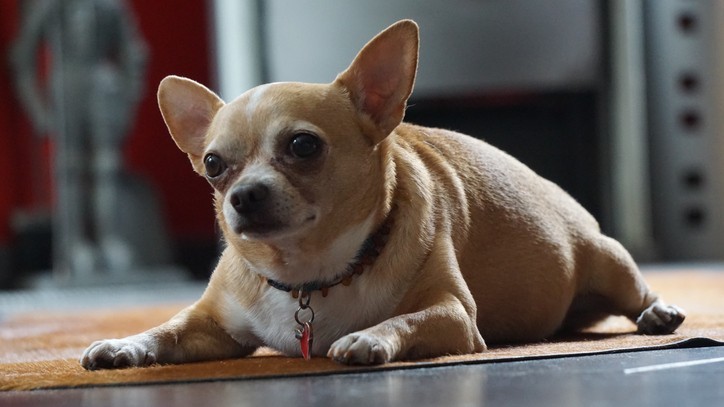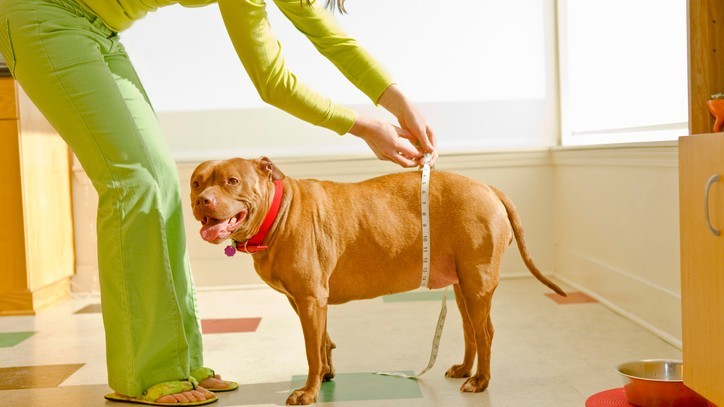What to do if your dog is overweight: How to win the battle of the bulge
If your dog is overweight, don’t despair! These steps can help your dog be healthy and active again

If your dog is overweight, you’re not alone. Obesity is a growing problem in our communities and it’s not just humans who are affected. More and more of our pets are now classified as overweight or obese, too. In the United States, a 2018 study found that more than half of all dogs were overweight. This is especially concerning because studies have shown that your dog’s weight can have a significant impact on his lifespan, and we all want our dogs with us as long as possible! Excess weight is also associated with many other medical conditions, such as arthritis, heart disease, diabetes, and even cancer. Although we are often tempted to equate food and love, the best way to show our pets love is to keep them healthy and active. If your dog is overweight, there are several steps you can take to help him get back to lean body weight and improve his overall health.
- Best dog food: Make sure your faithful friend gets the best in doggy diet
- Best dry dog food: Which brand of dry food is king of the kibble?
- Are dog treats healthy? How much is too much?
- Dog food ingredients explained
How to tell if your dog is overweight
So many dogs are overweight these days that it can be tough to tell whether your dog is a healthy weight or not. Don’t compare your dog to other dogs of his size or breed – this may lead you astray! Instead, try to evaluate your dog’s body condition score, or BCS. A body condition score is a numerical value used to assess the fat distribution on your dog’s body, and can help you determine whether your dog is overweight. This is a much more individualized assessment than simply using a number on the scale. To evaluate your dog’s BCS, you’ll need to gently feel the fat over his ribs, spine, and pelvis, and compare it to a scoring chart such as this one from the World Small Animal Veterinary Association. If your dog scores higher than a 5 on the body condition score chart, he may need to lose some weight! Your veterinarian will also assess your dog’s weight and body condition score at every visit, so be sure to ask for their assessment and compare it to your own at home.
Diet for weight loss in dogs
If your dog needs to lose some weight, the first step is closely examining your dog’s diet. Most weight gain is the result of your dog consuming too many calories on a regular basis. Remember to look at not only the calorie content of your dog food, but also any treats, chews, supplements, table scraps, and other additional foods your dog may consume. These extra snacks and treats outside of your dog’s regular meals are a huge source of excess calories! Treats should be limited to no more than 10% of your dog’s daily calorie intake. Your dog’s meals should also be fed in carefully controlled portions to prevent your dog from overeating. Using a measuring cup or a gram scale is the best way to ensure you’re feeding your dog exactly the right amount every time.
If you’re unsure how much your dog should be eating, it’s best to ask your veterinarian for advice. Your veterinarian can calculate your dog’s required daily calorie intake to ensure safe and gradual weight loss. Your veterinarian can also identify how much weight your dog needs to lose, and can help you fine-tune your dog’s diet so you’ll be more likely to succeed.

Prescription weight loss diets for dogs
If portion control alone isn’t enough for your dog to lose weight, your veterinarian may recommend putting your dog on a prescription weight loss diet. These are special dog foods that are carefully balanced to ensure your dog continues receiving proper nutrition despite the decrease in calorie intake. Many of these diets are also formulated to help your dog feel full even though he is eating less, so he’ll be less likely to beg for more. Some prescription diets even come with their own formulated treats, so your dog can still get an extra reward now and then without cheating on his diet! When used in combination with a reduction in treats, a regular exercise routine, and frequent weight checks with your veterinarian, prescription weight loss diets are often the key to success for dogs that are overweight.
Exercises for dog weight loss
Although controlling your dog’s diet is the most important factor for weight loss, regular exercise can also be helpful. Exercise not only burns calories, but also builds strength and improves mobility. If your dog has previously been a couch potato, it’s best to start your new exercise routine slowly and build your dog’s endurance over time. Low-impact exercises such as walking and swimming are the best options for overweight dogs, because they do not put any excess strain on your dog’s joints. As your dog’s weight and endurance improve, you may be able to progress to more strenuous activities such as agility. Remember that overweight dogs are much more prone to overheating than their healthy weight counterparts, so be extra cautious when exercising your dog on a hot day. To prevent your dog from becoming ill or injured during a workout, make sure you warm up slowly and provide plenty of clean, fresh water before, during, and after the activity.
Winning the weight loss battle
Weight loss is hard for everyone, but with patience and consistency your dog can get back to a healthy weight. Make sure your whole family is on board with your dog’s weight loss plan and ask your veterinarian for help and guidance along the way. Steady, gradual weight loss is the key to ensure your dog will lose weight and keep it off. With calorie restriction and low-impact exercise, your dog will be lean and active for the rest of his long and healthy life!
PetsRadar Newsletter
Get the best advice, tips and top tech for your beloved Pets
Dr. Elizabeth Racine is a small animal general practice vet covering all things pet health and wellness. Her special interests include veterinary behavior, nutrition, and internal medicine.
As a freelance writer, Dr. Racine has written content for major companies in the industry such as the American Kennel Club, Merck Animal Health, Bayer PetBasics, Elanco, and CareCredit. In her free time, Dr. Racine enjoys playing trampoline dodgeball, hiking with her beagle Dasher, and spending time with her three mischievous cats.

